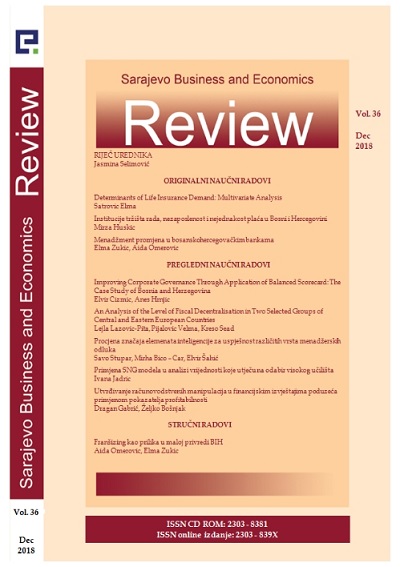Improving Corporate Governance Through Application of Balanced Scorecard: The Case Study of Bosnia and Herzegovina
Improving Corporate Governance Through Application of Balanced Scorecard: The Case Study of Bosnia and Herzegovina
Author(s): Elvir Čizmić, Anes HrnjićSubject(s): Business Economy / Management, Micro-Economics, Economic development, Socio-Economic Research
Published by: Ekonomski fakultet u Sarajevu
Keywords: Balanced Scorecard Concept; Business Measurement System; Strategy Implementation; Strategy Cause-Effect Map; Partially Mediated Model;
Summary/Abstract: From the very beginning of management concepts development, a great number of authors tried to find a comprehensive and systematic solution for managing different types of organizations. Nowadays in vivid and extremely competitive business markets, corporations must dedicate substantial amount of time, human capital and financial funds in order to adequately measure organizational performance as well as to evaluate progress in achieving strategic goals. Consequently, corporations are required to execute a suitable strategic management approach and organizational performance measurement system for capturing the value of intangible assets (which in today´s business environment constitute a large portion of total assets value) such as employee satisfaction, innovation, customer as well as supplier relationships. In that sense, balanced scorecard concept has emerged as a verified and effective business management tool in quest to capture, define and interpret intangible assets into real value allowing corporations to implement differentiating strategies successfully. The purpose of this paper is to present results of the investigation conducted in companies in Bosnia and Herzegovina. The research model is associated with certain familiar operational managerial concepts to each balanced scorecard concept perspective. The intention of the investigation is to measure the impact intensity of the balanced scorecard model variables to the effectiveness, efficiency and the financial results of domestic companies. The logic of the model is that knowledge management, total quality management and customer relationship management represent main elements of first three balanced scorecard customer perspectives and the intensity of using its postulates has a positive influence to the other balanced scorecard perspectives and specially, to the strategy implementation and better financial results.
Journal: Zbornik radova - Sarajevo Business and Economics Review (SBER)
- Issue Year: 2018
- Issue No: 36
- Page Range: 76-104
- Page Count: 29
- Language: English

